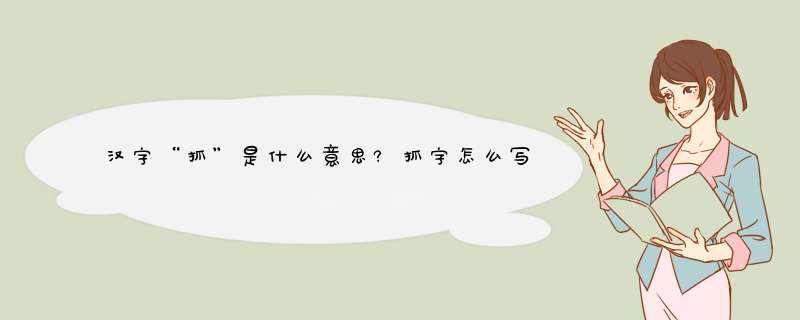
抓zhuā用指或爪挠:抓挠。抓痒
用手或爪拿取:抓药。抓彩
捉捕:抓贼。抓间谍
把握住,不放过:抓工夫
特别注意,加强领导:抓重点
引人注意:他一上场就抓住了观众
捕逮捉放笔画数:7;部首:扌;笔顺编号:1213324笔画顺序:横竖横撇撇竖捺
详解
抓zhuā动同本义〖scratch〗。人用指甲或带齿的东西或动物用爪在物体上划过杜诗韩集愁来读,似倩麻姑痒处抓。——唐·杜牧《读韩杜集》又如:抓挠;抓心用手或爪取物〖grasp;grab〗夫十围之木,始生而蘖,足可搔而绝,手可擢而抓。——《文选·枚乘·上书谏吴王》又如:抓子儿;抓挠;想抓救命稻草扎缚〖tie〗下面青白间道行缠,抓着裤子口。——《水浒传》又如:抓角儿;抓髻;抓扎;抓缚捉住〖arrest;seize;catch〗。如:抓强盗买〖buy〗。如:抓药抽〖draw〗。如:抓彩特别重视〖payspecialattentionto〗。如:抓经济问题负责工作〖takechargeof〗。如:抓工会工作抓辫子zhuābiànzi〖capitalizeonsb'svulnerablepoint〗比喻抓住缺点作为把柄抓兵zhuābīng〖compelamantoconscription〗旧军队强抓公民服兵役抓彩zhuācǎi〖drawalottery〗用抽签或其他方法来决定是否得彩抓差zhuāchāi〖presssbintoservice〗旧指官吏指派百姓服劳役,现泛指派人去做某事大家都不肯去,我只好抓差了抓点zhuādiǎn〖concentrateonworkatselectedunits〗在选择的单位重点加强某一项工作以获取经验,推广到其他部门或单位抓点带面抓丁zhuādīng〖press-gangable-bodiedmen〗旧政府强抓壮年男子当兵或服劳役抓赌zhuādǔ〖catchorarrestgamblers〗捉拿赌徒,查禁赌局抓耳挠腮zhuā'ěr-náosāi〖scratchone’shead〗乱抓耳朵和腮帮子。形容焦急、忙乱或苦闷得无法可施的样子。也形容高兴而不能自持的样子抓夫zhuāfū〖press-gang〗拉夫。也作“抓_”抓获zhuāhuò〖arrest;capture〗捕获抓紧zhuājǐn〖firmlygrasp;paycloseattentionto〗牢牢抓住,不放松抓紧时机抓阄儿zhuājiūr〖drawlots〗对难以确定的事或分配物品时,事先写在纸片上,卷团后随机抓取定夺抓举zhuājǔ〖snatch〗举重项目之一,双手一下从地上抓起杠铃,中间不作任何停歇地举过头,并伸直双臂抓拿骗吃zhuā-ná-piàn-chī〖swindleandbluff〗[方言]∶招摇撞骗这家伙是抓拿骗吃搞惯了的,改造了两次,还改不了老毛病抓挠儿zhuānaor〖thestretchingandcrookingofababy’sfingers〗[方言]∶小儿伸屈手指玩乐嬉戏瞧乖乖抓挠儿的样子多好玩儿抓牛鼻子zhuāniúbízi〖graspthekeylink〗比喻抓工作能够抓根本、抓重点抓手zhuāshǒu〖knob〗[方言]∶拉手抓瞎zhuā西安ā〖findoneselfataloss〗因毫无准备而仓皇失措抓小辫子zhuā西安ǎobiànzi〖capitalizeonsb’svulnerablepoint〗见“抓辫子”抓心挠肝zhuāxīn-náogān〖beupset〗比喻十分难受妈妈急得抓心挠肝,想去看看吧,工作脱不开。——关庚寅《“不称心”的姐夫》抓药zhuāyào〖fillaprescriptionofChineseherbalmedicine〗购买中药给婆婆抓药中药店照方称量分包药材刚到药店帮工的时候,他对抓药一窍不通他们工作是在药房抓药抓周,抓周儿zhuāzhōu,zhuāzhōur〖acustomoftellingachild’sfortunebyplacingvariousemblemsbeforehimandlettinghimchooseoneonhisoneyearbirthday〗旧俗,婴儿周岁时,摆放各种物品任其抓取,用来预测婴儿将来的志向、爱好等抓壮丁zhuāzhuàngdīng〖press-gangable-bodiedmen〗旧时官府强征青壮年男子当兵服劳役,也称“抓丁”抓总儿zhuāzǒngr〖beinchargeofthewhole〗〖口〗∶负责把握全局情况
出处
[①][zhuā][《__》_交切,平肴,_
][《__》__切,上巧,_
][《__》_教切,去效,_
]搔,用指甲或带钩齿的东西在物体上划过
用手、爪取物或握物
掌握
逮捕;捕捉
谓匆忙寻找
控制;吸引
束;系
弹筝的动作
因近似以手抓物,故称
配中药之称
谓加强领导或特别注重去做某方面的事情
卯集中手字部抓;康熙笔画:8;页码:页421第11唐__巧切集_正___切,音蚤
博雅搔也
又掐也
_子·徐_鬼有一狙焉,委蛇攫抓,_巧乎王
杜甫·__玉搔_,今之抓_也
又唐____交切集__篇_交切,音_
_同
又唐___正__教切集_阻教切,音笊
亦爪刺也
说文解字中没有查到汉字
不能。这里讨论下专项为举重时是否可用低杠位深蹲代替高杠位进行力量训练。以下观点部分参考自Starting Strength(SS)。首先举重比抓举和挺举,并不比奥林匹克深蹲(高杠位)。前蹲的练习用来加强下蹲翻(clean)。那么训练深蹲的一个目的应该是提升举重运动员的整体力量。这点低杠位胜出。在SS中作者认为高效的clean的拉起机制和硬拉应该相同,即:杠铃起始于脚中心,位于肩胛的正下方,肩后一点的位置。还解释了不同的人体结构比例下在正确的拉起起始姿势时产生的背/髋/膝角的不同。因此假设最高效的clean是采用这样的起始姿势并拉起,那么杠铃的重力作用方向延肩胛竖直向下。相较于高杠位中把杠铃在斜方之上,低杠位中杠铃在肩胛冈下一点点的位置。因此在深蹲底部时杠铃的重力方向与上述拉起机制中的杠铃重力方向非常接近。此外更接近水平的背角,使低杠位深蹲比高杠位更接近clean/snatch拉起的发力机制。然而众所周知,许多优秀举重运动员在拉起时会采用相较于硬拉更低的臀位,而降低臀部会使上半身后移,因此重力方向可能会直接作用在肩膀之下,很接近高杠位深蹲底部。这是两种截然不同的观点,SS中认为最高效拉起的起始姿势是杠铃起始于脚中心,位于肩胛的正下方,肩后一点的位置。这适用于硬拉,当然也适用于clean/snatch。从上述可以看出,SS作者对举重的解读略有不同。
Snatch和Clean and Jerk的中译名的精妙之处在于显出了中文表达更具意象。snatch是一个动作,clean and jerk是两个动作,英文表达就是规规矩矩按字面来。而中文则是用对仗的抓举(挂有形容词的意味)和挺举(两个动词,两个动作),不仅形象而且朗朗上口。
举重(Weightlifting),是以举起的杠铃重量为胜负依据的体育运动,由抓举和挺举两个项目构成。
1891年,首届世界举重锦标赛于英国伦敦举行。1896年,举重被列为奥运会正式比赛项目。1910年,卡斯珀·博格在法兰克福体育游戏展览会上首次展示片杠铃,成为世界举重发展史上的一个里程碑。1972年,第20届夏季奥运会举重比赛后取消推举项目。
举重项目的动作方式:
抓举:运动员将杠铃平行地放在两小腿前面,两手虎口相对撞杠,以一个连续动作把杠铃从举重台上举至两臂在头上完全伸直。
挺举:运动员以一个连续动作把杠铃从举重台上提置肩际。两腿平行伸直保持静止状态。先屈腿预蹲,接着用伸腿伸臂动作将杠铃举起至两臂完全伸直,两腿收回平行保持静止。
The World's Fastest Racket Sport: Badminton 羽毛球
As far back as the 5th century BC, the Chinese were playing Ti Jian Zi, or shuttle-kicking, a game played with the feet The shuttlecock was there, but it remains unclear whether it led to the game of battledore and shuttlecock that arose about five centuries later in China, Japan, India and Greece The battledores were the early versions of today's racquets By the 1600s, battledore and shuttlecock had developed into a popular children's game It soon became a favourite pastime of nobles and the leisured classes of many European countries, becoming known as "jeu de volant" on the continent
Badminton was contested as a demonstration sport during the 1972 Olympic Games in Munich It debuted as a full medal sport in 1992 at Barcelona Men and women compete at the Olympics in both singles and doubles, and the events have been dominated by Indonesia, China, and Korea It is recorded that the fastest speed of badminton is 332 kilometres per hour which is made by Chinese double men's players Fu Haifeng
racket: 名词,文中解释为"球拍"。它还可以作为动词表示"过着花天酒地"的生活。
battledore and shuttlecock: 板羽球游戏
racquet: 名词,球拍游戏。
pastime: 名词,娱乐,消遣
debut: 名词和动词,解释为"初次登场,亮相"。
The World's Crazy Sport: Soccer 足球
Game in which two 11-member teams try to propel a ball into the opposing team's goal, using any part of the body except the hands and arms Only the goalkeeper, when positioned within the penalty area in front of the goal, may use hands and arms The game's first uniform set of rules was put in place in 1863, when England's Football Association was created Professional leagues began appearing in the late 1880s, first in England and then in other countries The Fédération International de Football Association (FIFA) was founded in 1904, and has hosted the World Cup every four years since 1930 Football has been included in the Olympic Games since 1908 Now played on all continents in over 150 nations, with over 40 million registered players, it is the world's most popular ball game
propel: 及物动词,解释为"推进"。常用词组"propel sb to do sth",意为 "促使某人做某事"。
penalty area: 罚球区
registered player:注册球员 register作为动词时用于短语 "register with sb or sth",意为"到注册,登记"
Weightlifting 举重
An ancient sport as old as mankind, embodying the most direct manifestation of human strength, weightlifting has not only flourished, but developed into a modern sporting discipline for the 21st century The apparent simplicity of lifting the barbell from the ground and over the head in one or two movements is deceiving Weightlifting requires a combination of power, speed, technique, concentration and timing
Super heavyweight lifters normally claim the title of World's Strongest Man or Woman However, kilo per kilo, the lightest weightlifter is often the strongest
Men's weightlifting was on the programme of the first modern Olympic Games in Athens in 1896, and women participated for the first time ever at the Olympic Games in Sydney in 2000
Lifters perform two types of lifts - the snatch and the clean and jerk In the snatch, they lift the bar to arm's length above their head in one movement In the clean and jerk, they lift the bar to their shoulders, stand up straight, then jerk the bar to arm's length above their head Lifters are allowed three attempts at each lift, and their best snatch and best clean-and-jerk figures are added to determine the winners
embody: 动词,包含,体现。
manifestation: 名词,具体表现。其动词形式为manifest
Barbell: 杠铃
snatch: 抓举
Clean and jerk: 挺举
A Small Ball Creates a stir: Table Tennis 乒乓球
Table tennis developed in the late 19th century, although its origins are not well documented It is usually considered to be of English origin, and is described as a "miniature" tennis that was played indoors in the 1880s and 1890s The rules of the game were codified in 1922 by a Cambridge University student, Ivor Montagu (1904-1984)
In January 1926, five nations - Austria, England, Germany, Hungary, and Sweden - met to form the International Table Tennis Federation The World Championships began in the same year
The sport is widely practiced throughout the world Table tennis made its Olympic debut as a full medal sport during the Olympic Games in Seoul It was never contested at the Olympics as a demonstration sport Since the late 1950s, the Chinese have been by far the dominant country in table tennis
There are four table tennis events on the Olympics programme: singles and doubles for men and women The mixed doubles event is not held at the Olympics, but it has been an event at the World Championships since 1926
stir: 名词,文中解释为"轰动"。作为动词时,可解释为"搅拌", 还有一个固定短语 stir up trouble, 意为"挑衅"。
document:动词,文中意为"得到证明"。通常作名词,意为"文件"。
miniature: 形容词,文中解释为"微型的"。还可作名词,意为"缩小的模型,缩影"等。
codify: 动词,意为"法律化"。还可译为"编码"。
欢迎分享,转载请注明来源:浪漫分享网

 微信扫一扫
微信扫一扫
 支付宝扫一扫
支付宝扫一扫
评论列表(0条)